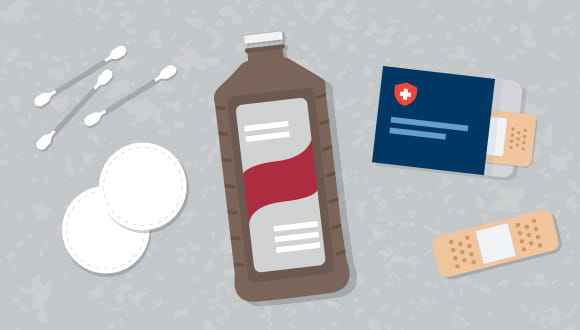Should You Put Hydrogen Peroxide on a Cut or Scrape?
June 3, 2022 - Katie McCallumAfter the *ouch* that accompanies a cut or scrape, the next step is dealing with it.
A little pressure to stop the bleeding.
A little fizz of hydrogen peroxide to clean it.
Wait ... should you really be cleaning a wound with hydrogen peroxide?
You probably remember a parent using it to clean a cut or scrape back in the day. But you might also now use it to disinfect your kitchen counters. That raises a logical question: Should it really be used on something as vulnerable as a wound?
What is hydrogen peroxide exactly?
At first glance, hydrogen peroxide actually looks pretty similar to water — by way of chemical formula, that is. Hydrogen peroxide (H2O2) contains just one more oxygen atom than water (H2O).
The addition may seem slight, but it's a fairly unstable, reactive one — the one that makes hydrogen peroxide a powerful disinfectant. It's also why it bubbles and fizzes when it comes into contact with certain organic and reactive substances.
"Hydrogen peroxide is a strong oxidizing agent," says Dr. Michael Yaakovian, a surgeon and wound care specialist at Houston Methodist. "This means it's capable of causing oxidation, which is the reaction it uses to destroy the cellular walls and other components that germs need to survive."
However, this doesn't mean it's Dr. Yaakovian's antiseptic of choice.
Why you shouldn't put hydrogen peroxide on a wound
You're right in thinking that a wound needs to be cleaned and kept clean.
"When you have an open wound, you don't have that normal skin barrier there protecting you anymore," explains Dr. Yaakovian. "This exposed area of tissue then becomes vulnerable to infection."
To help prevent this, people often douse a cut with hydrogen peroxide before applying ointment and bandage. They've been doing it for decades, in fact. But it's a practice that's no longer advised.
"Hydrogen peroxide is actually detrimental to wound healing," says Dr. Yaakovian. "It prevents healing rather than promoting it."
That's because its reactive power isn't specific to germs. Hydrogen peroxide also kills normal cells within the wound — including healthy skin cells and immune cells — and slows blood vessel formation, all of which are important for wound healing.
It's a similar story with rubbing alcohol, another substance commonly thought to help sanitize a wound. It, too, kill cells indiscriminately, preventing healing.
Here's the right way to treat a cut or scrape
First things first: any time you injure yourself, start by assessing the damage.
If it's a superficial wound, meaning just the surface of the skin is broken, you likely don't need to get it checked out by a doctor.
You do still need to clean and tend to it, though, so it's important to know how to properly care for a wound.
Here are the four steps to ensuring a minor wound heals promptly at home:
1. Clean it
Instead of reaching for hydrogen peroxide, wash your wound with clean water. You can also use a gentle saline solution, if you have one.
2. Add an ointment
Petroleum oil or antibiotic ointments help prevent infection by covering the wound and acting as a physical barrier, but they also serve another purpose: they help keep the wound moist. This is important because drying can prevent the wound from healing.
3. Cover it
Depending on the size and location of the wound, protect it from the elements using an adhesive bandage or sterile gauze pad. It may be easier to wrap some wounds with gauze.
4. Keep an eye on it
Check on your wound daily and beware signs of infection, which include increasing pain, redness and bleeding or oozing that won't stop. If your wound is infected, seek care.
If your wound isn't improving after a few days, it may mean it's not getting what it needs to heal. It also could be a sign that the wound is in danger of becoming chronic and needs evaluation — especially if you've been diligently following recommended wound-care steps but aren't seeing healing progress.
Wounds aren't always minor
The recommended four steps are only suitable for superficial wounds that don't require attention from a health care provider.
If your wound is a deep laceration or the result of an animal bite, it's important to seek evaluation right away. People with diabetes or a compromised immune system may also need to consult their doctor about wounds immediately, even those that seem relatively minor and especially in the case of diabetic foot wounds.








